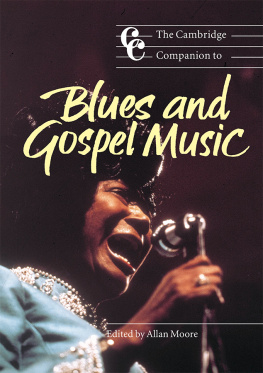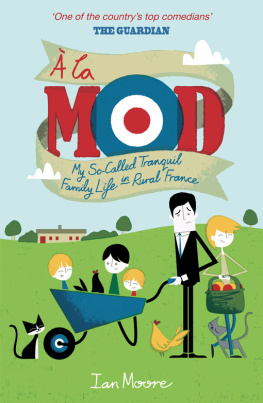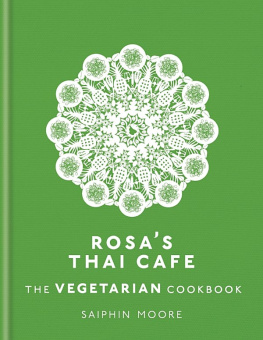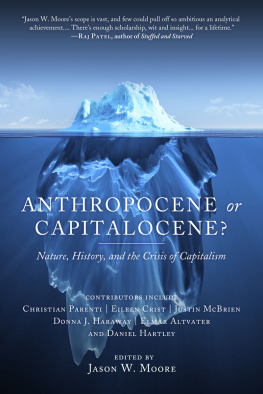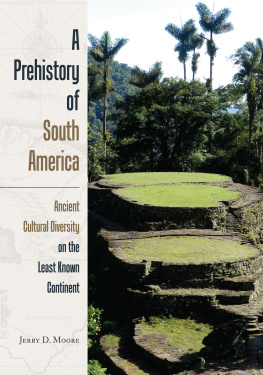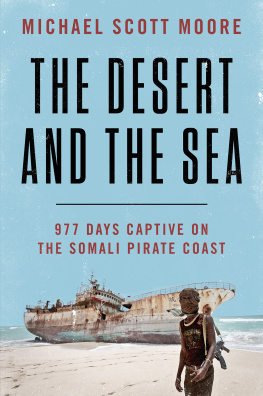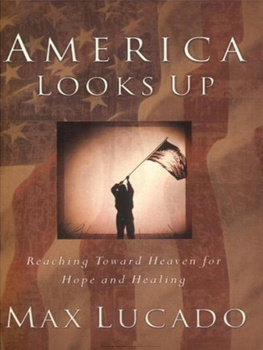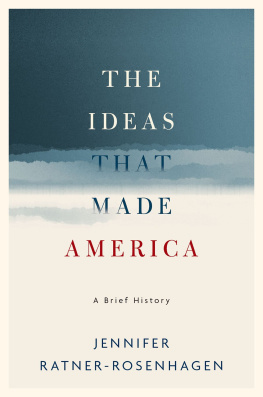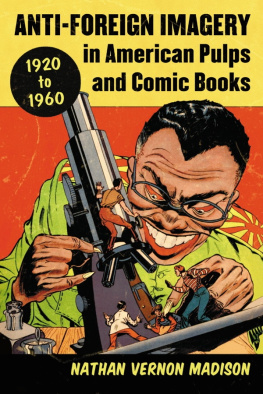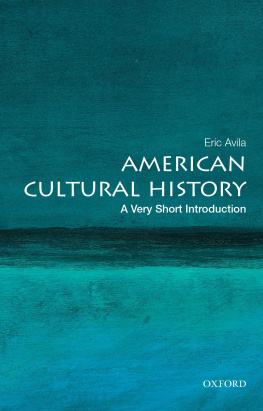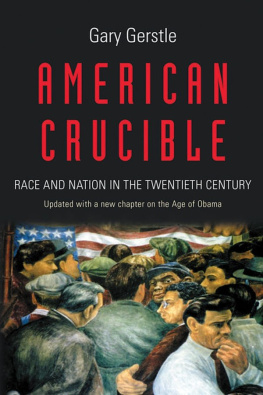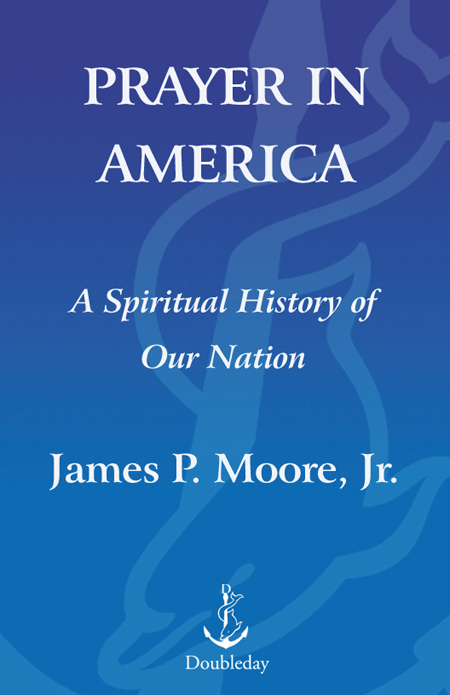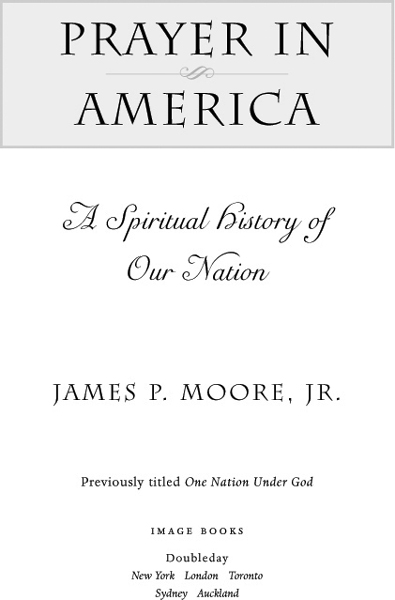Praise for Prayer in America
Prayer in America will become the most talked about book of the year. Given that nothing like it has ever been written, it surely will become an overnight sensation. Readers will find it hard to put down, as I did. No one should miss it.
Father Benedict Groeschel, C.F.R., author and television personality
Prayer in America may well outsell Gone With the Wind and with a superior message. This book is a great idea, beautifully written and executed.
Hugh Sidey, former Time columnist
My husband [General Omar N. Bradley] would have loved this book and in particular its treatment of prayer during wartime. Prayer in America is nothing less than a national treasure for all Americans to appreciate now and in the future.
Mrs. Omar Kitty Bradley (19222004)
Prayer in America is a fascinating pageant of conscience, urgency, pious pleading, and faithful prayer. Jim Moore has done a truly extraordinary job in telling this nation's history through prayer, reminding us not only of the turbulent events of our history, but of our dreams and our sacred hopes.
Rabbi David Wolpe, author and Chief Rabbi, Temple Sinai,
Los Angeles, California
Jim Moore has been prodigious in composing an exceptional, all-encompassing look into the prayer life of the country that is destined to become a national best-seller.
Reza Aslan, author of No God But God
This is a staggeringly important book from an important person. It should be read by all who hope and pray for the best in America. I am happy to recommend it highly.
Father Theodore M. Hesburgh, C.S.C.,
President Emeritus, Notre Dame University
This book is dedicated to my mother and father
Dr. and Mrs. James P. Moore
Who first taught my brothers and me how to pray

Exactly how Prayer in America was conceived and developed over time remains a mystery to me. I do remember, however, when I first thought about the project, during the fall of 1997.
It was early in the morning on Columbus Day that my brother called to tell me that our father had died unexpectedly in the middle of the night. It was a heart attack, and he had gone peacefully. As anyone who has ever experienced the news of that kind of sudden death can attest, the initial shock and the hours that followed became vivid memories frozen in time.
In the coming weeks and months, which would quickly turn into years, I traveled between Washington, D.C., and Ford City Pennsylvania, to provide support to my mother, a strong and fiercely independent woman, who within weeks of my father's death was diagnosed with Parkinson's disease. During those first few car trips, as I drove along the ridges and over the crests of the spectacular Allegheny Mountains, I began to think about prayer and the part it played in my life and in the life of the country. I thought about America's earliest settlers, their heirs, and the role that prayer had played in their lives. I remembered some of the country's most prominent figures and the crucial moments in history when prayer had provided meaning and given strength when comfort and hope were hard to come by. It also struck me that if prayer represents the most private, innermost thoughts of an individual or of a people, then it must convey something rather special about us as Americans and the times in which we have lived. It was then that I began to search for some kind of book that captured the significance of prayer in American history.
I was soon spending my evenings at the Bishop Payne Library at the Virginia Theological Seminary, the largest and oldest Episcopal seminary in the United States, located a few miles from my home. Night after night and during weekends I tried to find a book that spoke comprehensively to the importance of prayer throughout American history. To my amazement, none existed. Intrigued by the possibilities, I started to put the pieces of the puzzle together myself.
Being neither a professional historian nor a clergyman, I realized that I was at a bit of a disadvantage. Nonetheless, I had a lifelong interest for everything Americanhistory, religion, politics, literature, music, culture, sports, and so much more. Given that my initial research only fired my passions further, I thought that I could bring a fresh perspective to the subject matter. By the time I had completed the manuscript, after more than seven years, I knew I had unearthed a marvelous, hidden treasure chest. Although I knew that religious historians and even the general public were familiar with many of these riches, I also realized that the trove never before had been viewed so comprehensively. Rather excitedly, I now find myself in the position of lifting the chest's lid for others to see, hoping they will share the fascination I have felt during this incredible odyssey
In many ways, what I refer to as American prayer has been a difficult subject to tackle. Most people consider prayer so private that they shy away from discussing it. After dogged probing, however, I have managed to find fascinating anecdotes, long-forgotten diary entries, and other archived material related to the importance of prayer in people's lives. Reading the prayers left behind by a fallen soldier on the battlefield or by a person long gone, whose attic treasures hold intimate details of a spiritual life never fully known by others, seems to be terribly intrusive at times. And yet the legacy discovered after piecing together their lives and peering through their special lenses to understand more fully what they encountered and how they endured can offer precious, intimate insights. The intensely private world of one individual in prayer can unlock critical portals that would otherwise remain closed to another.
Having literally combed through thousands of books, periodicals, manuscripts, letters, and documents spanning several hundred years, I have been extremely careful to verify the accuracy of the material contained in this book. Since the beginning of the republic, several writers have attempted to embellish facts surrounding the spiritual nature or public religious acts of our most beloved figures, from Washington to Lincoln and beyond. In some instances they have recorded events that never happened. In their drive to create a pious aura around a particular individual or event in U.S. history, they have let their imagination get in the way of what truly happened. Consequently their absorbing but inaccurate accounts have been accepted as authentic by others and have ended up as gospel in subsequent writings, some two centuries later.
Quite frankly the story of American prayer is so powerful that it does not need to rely on anything but historic fact and reasonable interpretation. To create or perpetuate myths can only take away from that compelling story. I have tried at every turn to make sure that Prayer in America does not fall into that trap.
A FTER SO MUCH RESEARCH and considerable reflection, I find it sadly odd that so many extensive biographies have been written about famous Americans in which the author barely, if at all, has touched upon the spiritual life of the subject. Far from being merely sentimental, prayer is an integral, vibrant influence, particularly for Americans and within the context of the American experience. If someone has devoted even a limited amount of time to things spiritualwhether as a child in Sunday school, or even in confronting the death of a parent or spouse, or even in listening respectfully to the heartfelt prayers of othersprayer can affect that individual significantly. A person's spiritual life becomes part of his or her human composite, and by its very nature should be examined. At times the search is difficult given its private nature or the biographer's preoccupation with material more titillating. Not to try to probe the character of an individual to the fullest, unlocking in some way that person's spiritual dimensions, however, forfeits a more complete and often critical story from being told.


